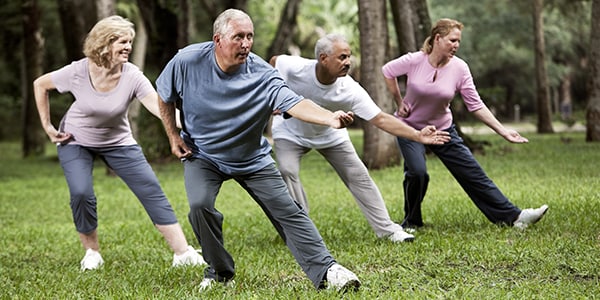Dementia: reduce your risk
It’s thought that simple lifestyle changes could prevent dementia in some cases. We ask experts for the evidence.
Charmaine Yabsley
July 2018
Dementia, a group of symptoms that causes progressive damage to the brain, affects 1 in 10 Australians over the age of 65.
For people with dementia it can be confusing and debilitating. For their loved ones it can be both frustrating and heartbreaking.
But a recent study says that 1 in 3 cases of dementia is preventable with easy lifestyle changes.
The study, the first of its kind by the Lancet Commission on Dementia Prevention and Care, reported the risk factors are:
- hearing loss
- low levels of education (researchers believe this reduces cognitive reserve or resilience)
- smoking
- type 2 diabetes
- social isolation
- high blood pressure
- untreated depression
- obesity
- physical inactivity.
In the study, these risk factors, which are described as potentially modifiable, add up to 35%. The other 65% of dementia risk is thought to be non-modifiable, such as ageing and family history.

Lifestyle changes to make
The good news, says Associate Professor Michael Woodward, chief medical advisor for Dementia Australia in Victoria, is that the recommended adjustments to your life to reduce your risk of dementia are part of overall healthy living. “You don’t want to assume that you won’t get dementia, but you’ll reduce your risk,” he says.
Follow a Mediterranean diet: In 2017, an analysis of the Health and Retirement Study in the US found that nearly 6,000 older people who followed a Mediterranean diet had a 30–35% lower risk of brain decline (such as memory loss).
“Your diet should not be too full of dairy, sugar or red meat,” says Assoc Prof Woodward. Instead, eat more fruit, vegetables, whole grains and olive oil.
Move as much as possible: “Moving for 30–60 minutes, 3 times a week as a minimum, is advised,” he says. “Whether you’re jogging, walking, swimming, cycling or some other sport which gets your heart rate up, you need to commit to this. But you should also remain active on the other days. Don’t just go to the gym for 3 days and spend the rest of the time in front of the television.”
Do some gardening, go for an easy walk or a gentle swim – these are all good ways to get moving on your ‘rest’ days.
Avoid high blood pressure: “Looking after cholesterol and blood pressure are ways to help reduce your risk of dementia,” agrees Woodward. If you’re worried about your blood pressure, speak to your doctor for ways to manage it.
Be social: Keeping socially and mentally active keeps your brain stimulated, and could also reduce risk of dementia. “Keep in touch with society by going to group activities, volunteering or having regular meet-ups.”
Symptoms of dementia
Dementia Australia reports that the following symptoms could indicate dementia. If you or a loved one are experiencing memory loss, or are concerned about any of the following, speak to your GP.
- difficulty performing familiar tasks
- difficulty finding words
- loss of initiative
- misplacing things regularly
- changes in moods or behaviour
- disorientation of time and place
- problems with abstract thinking (e.g. paying bills or making decisions)
- poor or decreased judgment.
Although dementia symptoms can differ for each person, usually the onset is gradual and, in the early stages, this can make the symptoms difficult to confirm.
“There are some you can’t do anything about, but you can still make changes,” says Woodward. For instance, he says, if you didn’t finish education you can still go back to study and remain motivated. Overall, it’s mostly important to stay healthy and have regular medical checks.
Related articles
TOTAL RECALL: TIPS FOR IMPROVING YOUR MEMORY
Constantly looking for your keys? Beat momentary memory lapses with a daily mental workout.
THE POWER OF BRAIN TRAINING
Can you really train your brain to perform 30 years younger? According to the experts, neuroplasticity means you’re only as young as your brain can think.
MEMORY LOSS OR DEMENTIA: HOW TO TELL THE DIFFERENCE
As we age, our focus, ability to retain new information and memory may diminish, but dementia goes much further. Here’s what you need to know.
FINDING HAPPINESS IN OLD AGE
Research shows that our ‘third age’ – the years after we retire – can be the most rewarding.